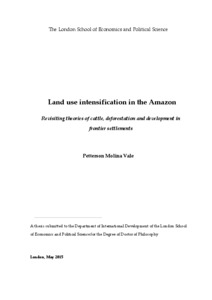Vale, Petterson
(2015)
Land use intensification in the Amazon: revisiting theories of cattle, deforestation and development in frontier settlements.
PhD thesis, London School of Economics and Political Science.
Abstract
More cattle, less deforestation? Land use intensification in the Amazon is an unexpected phenomenon. Theories of hollow frontier, speculative behaviour and boom-bust all share the prediction that livestock production will remain largely extensive. Yet between 1996 and 2006 productivity of cattle grew by an astounding 57.5% in the average Amazon municipality. How can this unlikely outcome be explained? What consequences for deforestation and human development? I provide a new framework for the analysis of the link between intensification, deforestation and development, focusing on four key elements: (i) frontier migration, (ii) land speculation, (iii) the rebound effect hypothesis, and (iv) the boom and bust hypothesis.
Does rising land productivity of cattle increase deforestation? If so, how? Based on a comparative case-study approach I assess the micro-level foundations of the proposition that intensification leads to frontier migration and deforestation. I employ an innovative procedure to collect georeferenced survey data that I then use to provide an initial test of the proposed model of land use intensification and frontier migration. I further use secondary data and spatial econometrics to look for evidence of a positive relation between cattle intensification and deforestation (‘rebound effect’). The results suggest a substantial land-sparing effect, whereby intensification in consolidated areas is associated with lower deforestation in frontier municipalities.
Do booms in deforestation lead to busts in development? I use different sources of secondary data to scrutinize the theory that predicts welfare to bust as deforestation advances, and find consistent evidence against the supposition that deforestation impacts welfare in either direction. Land use intensification is the opposite of a bust in agricultural output, so the rejection of the boom-bust hypothesis is in agreement with the depiction of a rising land productivity. This does not preclude deforestation from affecting long-term welfare in the Amazon or in the rest of the world, neither does it imply that conservation should not be a policy objective. It suggests that policymakers facing explicit short term welfare targets at the local level may focus on other policy variables than deforestation.
Actions (login required)
 |
Record administration - authorised staff only |
![[img]](http://etheses.lse.ac.uk/3088/1.hassmallThumbnailVersion/Vale_Land_use_intensification_in_the_Amazon.pdf)



 Download statistics
Download statistics Download statistics
Download statistics